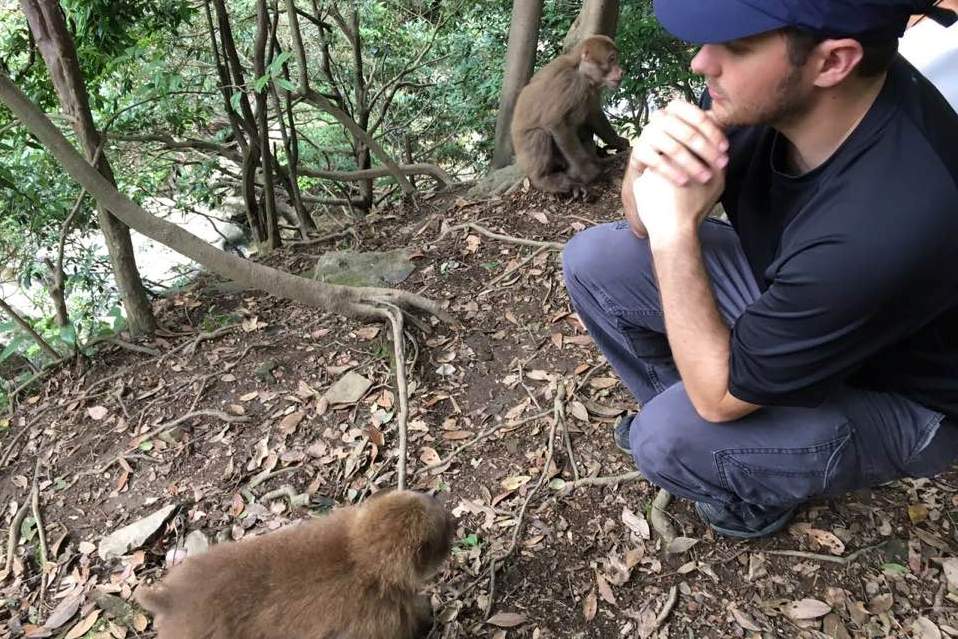Kyle Runzel is our latest Wildlife Research Intern. He is a San Diego native who recently earned a Master’s degree in Anthropology from Central Washington University. In this post he shares with us what motivated him to intern with LVDI International and how this learning experience has shaped his professional aspirations.
***
Throughout my youth, I spent many afternoons exploring the canyon behind my house. The dusty, dry canyon was enveloped with various shades of brown from drought-stricken plants, and exposed sandy hilltops, which only accentuated a vibrant green belt along the meandering creek. While this arid scenery might seem ordinary to Southern Californians, it hides a unique natural history slightly below the surface. If one were to shuffle their feet while trekking through this landscape, they would eventually notice a seashell or two flipping to the top. Such experience would be my introduction to the tremendously long evolutionary history of local wildlife in Carlsbad, and uncapped a flowing curiosity about my surrounding environment. Chasing an answer to the question, “Why would a seashell be five miles from the sea?” eventually would lead to my lifelong pursuits in wildlife biology and conservation.

My passion for wildlife research drew me to seek an internship with LVDI International. While contributing to this local organization, I could expand my scientific reach past San Diego to a global community including but not limited to China, Madagascar, and Vietnam. Their motto – Empower People! Save Wildlife! – resounds deeply with my personal ambitions to inform communities about the importance of local wildlife and provide tools to protect their wondrous neighboring species. Sadly, after returning home from pursuing higher education in another state, I learned my canyon playground had succumbed to housing development and road expansions. The community I lived in was notified of the plans for this development a few years back; however, many residents were unaware of the importance the canyon had on the local ecosystem or the influence it might have on the new generation of children. It is my goal, through LVDI International, to help other communities stay aware of their local environmental issues and empower them to protect what otherwise might be taken for granted.

Currently, I am contributing to a collaborative research project between LVDI International and GreenViet that examines the activity and spatial use patterns of sympatric primate species in central Vietnam. The data were gathered using camera trap photography that poses minimal intrusion by researchers to the monkeys. In the wild the monkeys are likely hunted by poachers. Therefore, this type of research has benefits to the monkey populations in the long run. Thanks to the guiding hand of my scholarly mentor, Dr. Chia Tan (Vice President), I am gaining practical training and learning something new about the geographic distribution of endangered species and their community ecology. We will use our findings to further improve conservation initiatives in Vietnam.


The tools and resources provided to me through my internship at LVDI International have been instrumental in directing my passion toward real-world conservation so I can make a positive impact in both people’s and animals’ lives. LVDI International also has provided me with opportunities to develop my communication, critical thinking and analytical abilities. All these skills are crucial for my professional advancement as a wildlife researcher. Beyond pursuing my previously stated passions, the work of LVDI International has convinced me to always include an educational component to my career goals. The importance of sharing knowledge with communities both local and abroad cannot be stressed enough. I now aim to not only engage fellow scientists with my research, but also provide public education and outreach, no matter how brief, to those I might meet along my scholarly voyage.
Being a part of this exciting organization has already exceeded all my expectations as a wildlife research intern, which is only one of the many positions LVDI International offers to their volunteers. Although all of their research and conservation programs present incredible opportunities, they work hard to match a project that best fits the volunteer’s own interests and time constraints. It would not surprise me if I continued to be a part of LVDI International five, ten even twenty years down the line no matter what role I would play. I highly recommend volunteering for LVDI International not only for their incredible mentorship, but also for the visible growth it provides for aspiring students, researchers, and wildlife enthusiasts.
